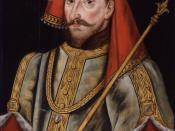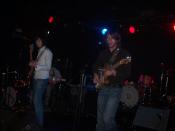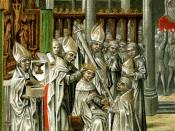In "Henry IV" by Shakespeare, there are a number of important characters. Shakespeare tends to have the different characters parallel each other, to show contrast and similarity. One extremely interesting parallel is between Henry IV himself, the king, and Falstaff, the drunken knight.
Henry Bolingbroke was thrust into the spotlight after the beheading of Richard III. He became King of England through treachery and bloodshed, but has since tried to be a good ruler over the people, and a good father to his children. However, his son, Henry (or Hal, as he prefers to be called), has been led astray from the path of kinghood. Henry IV has tried to make Hal into an upstanding, law-abiding citizen and has pushed too hard, leading Hal to try and be exactly opposite of his father's wishes. His friend Northumberland has a successful son, also named Harry (nicknamed Hotspur). Henry IV is jealous of them and often complains about his son- "...That
my Lord Northumberland should be the father to so blest a son. A son who is the theme of honor's tongue ... whilst I by looking on the praise of him see riot and dishonor stain the brow of my young Harry. O that it could be prov'd that some night-tripping fairy had exchang'd in cradle-clothes our children ..."
Falstaff was a knight of the realm, and has declined into a fat, alcoholic tavern rat and thief. He believes in enjoying life to the fullest, and would rather sit and enjoy countless cups of sack (similar to whiskey) and capons (chickens) than protect the people. Hal spoke truly when he mocked Falstaff for asking the time of day- "What a devil hast thou to do with the time of the day? Unless hours were cups of sack, and minutes capons, and clocks the tongues of bawds, and dials the signs of leaping-houses, and the blessed sun himself a fair hot wench in flame-colored taffeta, I see no reason why thou shouldst be so superfluous to demand the time of day."
Falstaff frequents taverns and brothels, and is Hal's best friend. Such a lifestyle consumes money at a swift pace, so Falstaff and his band of thieves rob people when they require more money. Falstaff is a liar and a cheat, and loves embellishing stories to glorify himself- "All? I know not what you call all, but if I fought not with fifty of them I am a bunch of radish. If there were not two or three and fifty upon poor old Jack, then I am no two-legg'd creature." He and his gang are always trying to get Hal to be like them; to join them in a robbery or to stay with them at the tavern.
In a soliloquy at the end of Act I, Hal seems to have decided that he will enjoy himself for now, and be as reckless and carefree as he pleases, but when the time comes he will rise to the throne and be a good king as his father wishes. However, he has not told anyone of this plan, and thus vexes both Falstaff and Henry IV with his behavior. Falstaff mentions, when Hal refuses to accompany the group on a robbery, that "there's neither honesty, manhood, nor good fellowship in thee, nor thou cam'st not of the blood royal, if thou darest not stand for ten shillings."
Falstaff and Henry IV both serve as father figures for Hal, each on one end of the spectrum. Henry IV pleads with Hal to set an example for the people, and to be a good, God-fearing, law-abiding prince to show everyone what a good father he is. Henry IV does not want Hal to be good for Hal's sake, but rather for Henry's and the court's image. Falstaff tries to lead Hal to a life like his; of thievery and sin, because he believes Hal (and everyone else) would be far happier that way. Falstaff also thinks it'd be a great joke if the crown prince of England were a criminal. Hal must choose between these two people to bring closure to the play, and as of yet he has not done so. The audience waits with bated breath for the prince's choice- Henry IV the risen king, or Falstaff the fallen knight.





